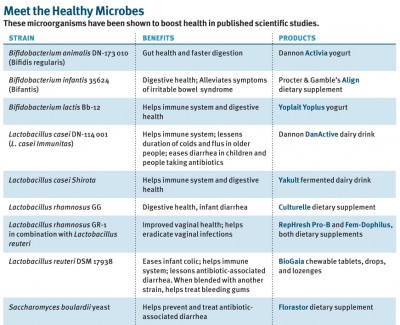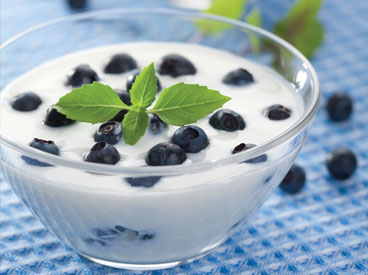Baba Vasilika, a peasant from a small village in Bulgaria, lived to be 126 years old and her son, Tudor, to 101. The secret to their longevity, says a 20th century text, was a daily diet of sour milk, packed with beneficial bacteria.
The story, recounted in a 1911 book The Bacillus of Long Life, describes healthy bacteria now called probiotics. Today, probiotics—defined by the World Health Organization as live microbes that confer a health benefit—are one of the hottest consumer health products. Last year, according to research firm Euromonitor International, more than 63,000 tons of probiotic cultures were consumed worldwide.
Americans are turning to probiotics in part to counter the sanitizing effect of modern food processing, which minimizes risks of pathogens in food but also kills natural flora which some scientists believe have health benefits. Live bacteria, originally marketed mainly in yogurt and dietary supplements, are now being added to breakfast cereals, juices, sports drinks, muffins, chocolate, and even pizza. Potential health benefits range from better digestive health to prevention of colds and flus.
Consider Herald Hollingshed, a 44-year-old technical director for a computer-services company, who felt his digestion started “slowing” when he hit middle age. He was frequently uncomfortable and bloated, but found relief with a Procter & Gamble product, Align. The pill “helps everything flow as it should,” says Hollingshed, who also switched to a healthier diet. “I feel in my best shape ever.”
For Cheryl Richardson, a 67-year-old retired lab technician from Chestertown, Maryland, probiotics over the years have helped balance the negative effects of antibiotics. Several years ago, after becoming ill from restaurant food while on vacation in the British Isles, a doctor prescribed an antibiotic that seemed to throw her digestive system out of whack. High doses of probiotics put it back on track.
“This replaces all the bacteria and helps your system digest food properly,” says Richardson.
For consumers, it’s simultaneously a cornucopia of choice and a confusing cacophony of marketing messages. The consumer “goes into a supermarket and has no idea which product to buy,” says Gregor Reid, professor of microbiology at the University of Western Ontario’s Lawson Research Institute. Despite the potential for confusion, scientists say probiotics hold great promise for human health. The evidence lies, in part, with the beneficial effects of breast milk. Beneficial gut flora called bifidobacteria are higher in breast-fed infants than in those fed by formula, says Glenn R. Gibson, professor of food microbiology at University of Reading in England, adding that the breast-fed infants have lower incidence of asthma and eczema. Good bacteria drop after babies are weaned, then remain stable through adult life until they drop precipitously around age 60 to 65. “They don’t go away completely, but they decrease and make us more prone to infections,” Gibson says. Low levels of good gut bacteria, he says, is likely at least part of the reason why the elderly suffer most during food-poisoning outbreaks.
The theory of how probiotics help us has for years been simple: The good bacteria crowd out the bad, resulting in better health. In recent years, scientists have learned that probiotic bacteria also take on many more useful tasks, says Philip M. Sherman, a scientist at the Hospital for Sick Children in Toronto. For example, scientists believe some types of probiotic bacteria help boost production of a protective mucus which lines the gut. Others, he says, produce cellular messages that calm harmful inflammation.
A growing number of scientists believe that gut microbes can change overall health. Scientists are beginning to study the use of probiotics to treat depression and even obesity. Benefits have already been shown for the digestive system, immune modulation, and dental health. There is even talk of the potential to increase longevity. “It’s exciting and there’s great promise,” says Joan Salge Blake, a clinical associate professor of nutrition at Boston University and a spokeswoman for the nonprofit Academy of Nutrition and Dietetics.

If you want the benefits of probiotics, you need to select carefully. “It’s not one size fits all,” says Salge Blake. “The one that may help with constipation is different from the one that may help with immune support. Make sure you are getting the right strain for what you want.”
For example, Dannon Activia yogurt and Procter & Gamble Co.’s probiotic capsule Align have shown in scientific studies to improve gastrointestinal health. In four published studies, Activia improved food’s transit time through the gut. Align, shown to be effective in a chronic condition called irritable bowel syndrome, is also helpful for milder digestion problems.
Become a Saturday Evening Post member and enjoy unlimited access. Subscribe now




Comments
I want the State out of my food and body.
There’s no moral justification for government busybodies declaring what I can and cannot eat, coercing me into compliance with violence-backed threats and guns, and charging me via taxation for their unsolicited and unwanted ‘service’.